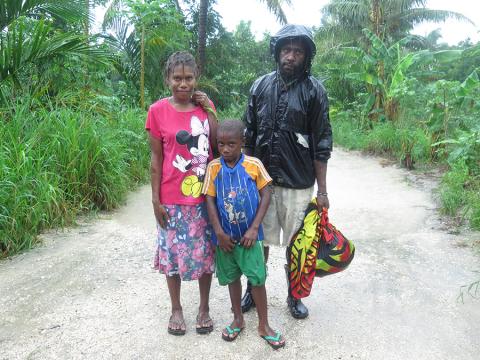Disaster risk reduction messages help communities stay safe in Vanuatu

Vanuatu has experienced an increase in natural disasters over recent years. With the trend set to continue, those living in vulnerable areas will face many challenges that will stretch both human and material resources.
However, the severity of the impact can be mitigated with the right planning and preparation by organisations, governments, churches and communities.
World Vision Vanuatu continues to expand its focus by including community-based disaster risk reduction measures in various projects with the aim of ensuring communities are safer in the event of a natural disaster.
Nini Tamasiu, formerly Word Vision Vanuatu’s Cyclone Pam Response Manager for Tanna, said World Vision has been working to assist staff and communities to be resilient to disasters by setting up community disaster committees to manage the community’s disaster planning efforts before, during and after natural disasters.
“During the recent category 5 Cyclone Donna, community disaster committees tracked the cyclone, informed people of the location of evacuation centres and set up a task force to provide assistance to children, people with disabilities and widows”, Nini shared.
Nini Tamasiu (centre) and the World Vision team discuss the importance of humanitarian accountability during the Cyclone Pam response
Jenny Kalpukai, a 38-year-old mother of three, lives a 15-minute drive from Vanuatu’s capital Port Vila in an area vulnerable to natural disasters. She said people in her area now respond positively to disaster risk reduction messages.
After Cyclone Pam people learnt valuable lessons and now work more closely with World Vision and the National Disaster Management Office (NDMO) before, during and after disasters.
“As Cyclone Donna was approaching, we were not waiting for the NDMO to tell us what to do; we gathered our important documents and some food and moved to evacuation centres. Previously the World Vision water, sanitation and hygiene team came to connect our water here and deliver DRR messages so we would know what to do during a cyclone”, she said.
Mrs Kalpukai said her community will continue to work with World Vision to disseminate disaster risk reduction messages to the whole community
Her community remains particularly vulnerable as it is situated near a stream.
World Vision Water, Sanitation and Hygiene Project Manager, Johnnah Nahwoh, said he was so grateful to see that Mrs Kalpukai’s community had actioned the disaster risk reduction advice they had received.
Most children, women and men went to evacuation centres as Cyclone Donna was approaching and after the cyclone threat had passed, they returned to their homes and boiled water before drinking.
World Vision will continue to implement disaster risk reduction measures to help keep communities safe during natural disasters.

